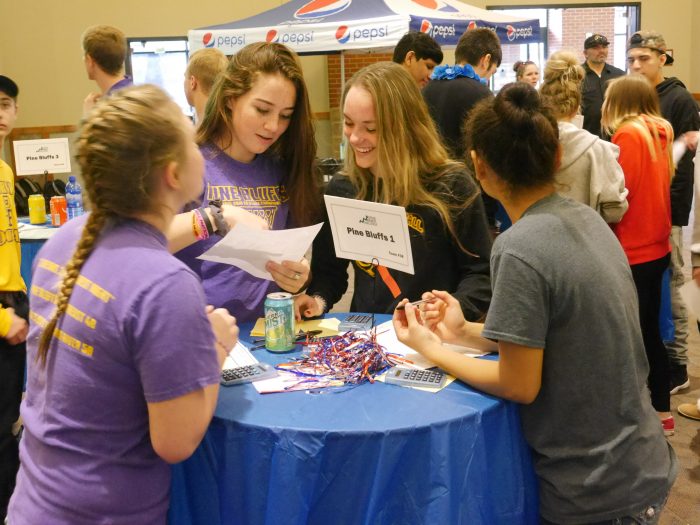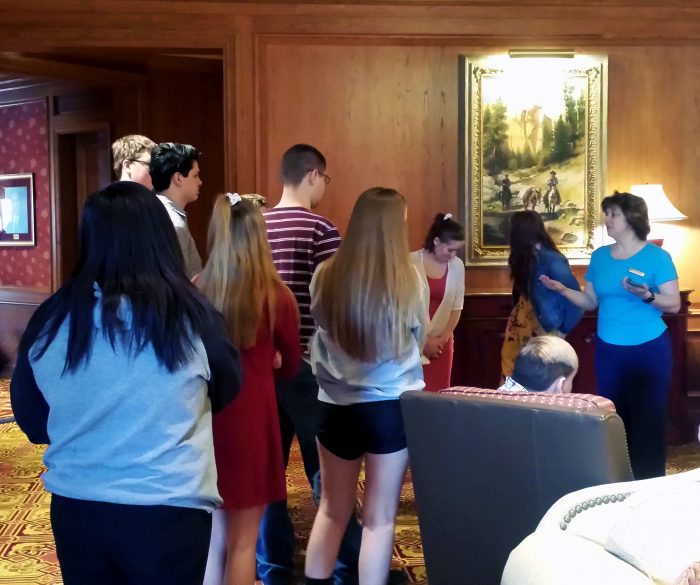A lot more students in Wyoming ended the school year this year with sharpened financial literacy, entrepreneurship, and 21st century work skills. That’s because Junior Achievement (JA) has expanded its presence in Wyoming with more classroom and community partnerships to better serve rural youth thanks to a growing volunteer base and significant financial support from the Wyoming Community Foundation and Wells Fargo.
Leading the charge for this expansion is Elizabeth Winn, JA-Rocky Mountain District Director for Northern Colorado and Wyoming.
“I hold a passionate view that rural America matters,” Winn says. “I also recognize that these communities can suffer from a variety of challenges.”
JA aims to give kids a chance to own their futures regardless of their background, so it’s crucial to identify any barriers that stand in between students and their potential for success.
Pew Research Center reports that rural Americans, especially those without a college degree, are less optimistic about their financial future, and on average, rural workers earn less than their urban counterparts. We can even see an example of this discrepancy in Laramie where the median household income is $17,000 less than Denver. Research from the Wyoming Business Council also finds that of all workers 18 years old, only 40% are still working in Wyoming 10 years later. Wyoming communities today are facing the need to equip young people with crucial financial literacy and career-readiness skills, diversify industries through entrepreneurship and innovation, and incentivize people to stay in the local workforce. JA is determined to step up and creatively transform these challenges into opportunities.
“We are constantly on the lookout for new and innovative ways to engage youth. Outside-the-box thinking is a necessity to meet our program demand, and sometimes this means looking beyond traditional classroom delivery of our programs. This is especially true for our rural areas,” Winn says.
Through funding received from the Wyoming Community Foundation, one of the catalysts for JA’s growth was a partnership with the Wyoming Afterschool Alliance (WYAA), led by Linda Barton and Joan Evans. The organization recently received a grant from the Mott Foundation to implement career-readiness and entrepreneurship training for middle and high school students in afterschool and summer programs statewide. They know that their state must rely on positive youth development and workforce readiness if they want their communities to succeed, so when Barton and Evans saw Winn give a presentation about JA at a WYAA conference, they found the perfect way to accomplish their goal: a strategic partnership with JA.
“In terms of what we wanted, the concepts and content of JA curricula are exactly right for us,” Barton says.
Sometimes youth living in small towns can experience a feeling of isolation, but Evans is hopeful that by participating in JA programs, middle and high school students will discover new perspectives as well by JA volunteers.
“I think the more views from the outside that we can show kids, especially if they live in a small community, the more they’ll expand the way they think and the way they problem-solve,” Evans says.
Several additional organizations and school districts approached Winn this year to express their need for JA programs. JA programs are now ramping up at Boys and Girls Club centers in Casper, Buffalo, Rawlins, and Cheyenne. Through the help of the WYAA, JA is now engaged with the City of Cody, Platte County STEAM Academy, Wyoming Indian School, Elevate Wyoming, YWCA of Sweetwater County, and more.
Winn says, “This growth has been possible because of the way we’ve tailored our programs to the community’s needs.”
This tailored approach further proved to be successful through a partnership with Little America Hotel and Resort in Cheyenne for a new JA program, JA Personal Success: Hospitality and Tourism. Following classroom lessons, students were invited to Little America for an onsite tour and mock interviews with real professionals in the industry.
“It’s so important for the kids to see that their learning translates to real life,” says Little America Human Resources Manager Penny Fletcher. “Tourism in Wyoming is one of the industries that continues to make money even when some of the other industries have a little bit of a downturn, but it can only succeed if we have a workforce, so we have to get people excited to come into the industry,” Fletcher says.
Some JA students received even more of a “real-life” experience at Little America. The interviewers were so impressed by three of the students that they offered them jobs at the resort. “We were able to fill slots for a real need at our property with kids that are obviously taking this stuff seriously,” Fletcher says. “They might not make hospitality a long-term career, but then again, they could. That was an immediate return on investment.”
Ultimately, Winn hopes that this momentum generated by JA helps communities instill hope in their youth; to envision a future in their home state, giving back to the local economy and bringing their entrepreneurial spirit to Wyoming’s workforce.



